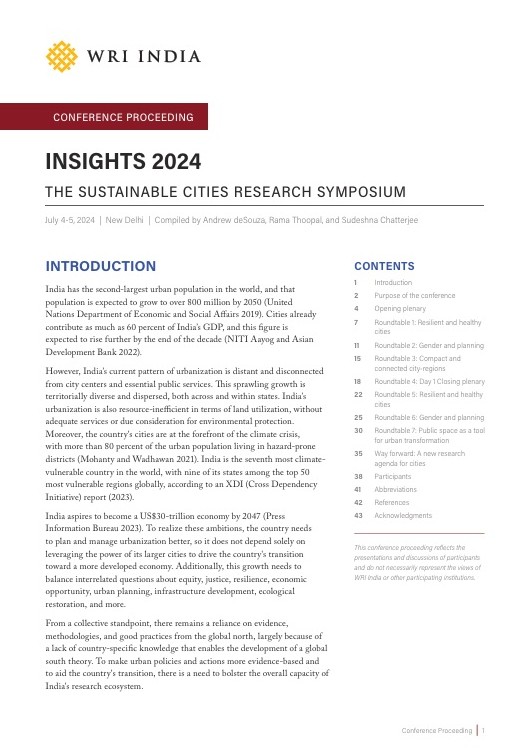How State-Level Commitments to Vision Zero Could be a Game Changer for Road Safety in India

Last year, WRI India launched India Vision Zero, a road safety forum to deliberate on the challenges, opportunities, and solutions towards reducing road traffic fatalities in India. The event brought together representatives from the national and state governments, as well as city authorities and other stakeholders to share ideas and strategies for road safety reform in the country. India currently tops the list with the highest number of road traffic deaths in the world. By contextualising successful Vision Zero programmes implemented globally, these numbers can be reduced.
Vision Zero is based on four key principles: safety comes first; human error must be accounted for; there is a joint responsibility between road users and road authorities; and a co-ordinated strategy involving various agencies responsible for road transport is required.
Using learnings from the India Vision Zero forum, Haryana became the first state government to commit reducing road traffic crashes by launching Haryana Vision Zero earlier this month. Chief Minister Manohar Lal Khattar stated that his government would plan and implement a series of interventions in order to bring the number of road traffic fatalities down to zero. These would include improvements in road design and enforcing policies to curb road rage and drunken driving, reducing speeds in cities, and providing prompt emergency care to the victims.
While national initiatives like India Vision Zero, and policy interventions like the Motor Vehicle Amendment Bill are steps in the right direction, state-level initiatives, like Haryana Vision Zero, will go a long way towards supporting India’s commitment to the Brasillia Declaration, which intends to reduce global road traffic deaths by 50 percent by 2020.
The Government of India’s commitment to reducing road traffic fatalities is bold and ambitious. However, to see results, state governments need to follow through with implementation. Initiatives like Haryana Vision Zero are important for India to improve its road safety numbers, and here’s why:
Partnership is Key: Urban roads have multiple stakeholders. Quite often, in the event of a road accident, the police and local hospitals get involved. However, wider engagement is required. Through Haryana Vision Zero, a platform was created to bring together the government, civil society, emergency services so that there is a greater shared responsibility towards road safety.
Data before Action: For any intervention to be successful, it is crucial to base proposed solutions on data. However, lack of up-to-date and complete data makes compounds the problem of road safety in most cities. The Haryana Vision Zero campaign places emphasis on data collection, starting off with the 10 districts in the state with the worst road safety records. Using this data, appropriate road safety strategies will be development and implemented.
Safer by Design: Traditionally, conversations around road safety tend to veer towards issues of enforcement and awareness. While these are important, there is definitely more to road safety. For instance, road design and engineering play a crucial role in this regard, but is often neglected. The Haryana Vision Zero initiative stresses on safer infrastructure, taking steps to identify ‘black spots’ or key accident-prone areas, and implementing solutions to make those areas safer.
Recent developments at the national and state levels are indicators that road safety is no longer a neglected issue in India. However, much more needs to be done. State governments are best positioned to tackle this issue. While Haryana has taken steps in the right direction, we need more states, and bigger states with higher road fatality numbers, to make similar commitments so that the conversations and interventions towards making Indian roads safer can be mainstreamed effectively.
In June, the Government of Maharashtra’s Motor Vehicles Department is partnering with WRI India to host the second annual road safety conference, India Vision Zero 2017, in Mumbai. The event will facilitate an exchange of ideas and experiences for improving road safety in the country with speakers and participants from multiple agencies from across the country. It is hoped that many more states would follow Haryana’s example in making strong commitments towards reducing road fatalities.


